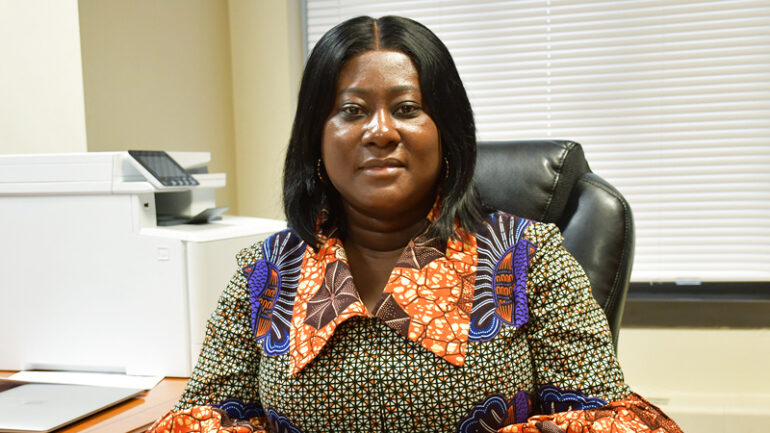Statement at the High-Level Thematic Debate on Digital Cooperation and Connectivity

- Posted by admin
- Posted in News, Statement & Remarks
Carolyn Oppong-Ntiri (Mrs)
Acting Head of Mission
Ghana Permanent Mission to the United Nations
April 27, 2021, New York City
AS DEIVERED
The President of the General Assembly,
Excellencies,
Ladies and Gentlemen,Ghana thanks the President of the General Assembly for convening a debate on this very important
topic on Digital Cooperation and Connectivity.
Admittedly, digital connectivity through innovations has brought enormous benefits to our generation. It is reshaping our global economy, permeating every sector and aspect of our daily
lives, changing the way we learn, work, trade, and socialize. However, about 3.7 billion people remain digitally disconnected and do not have the option to
work remotely, especially in the developing world. Other challenges in the sector including the risk of cyber-attacks and fraud, threats to privacy are also of major concern. Furthermore, the
COVID-19 pandemic has also revealed lapses in our efforts to improve on digital cooperation. These challenges should spur us on into taking urgent actions to address the situation.
Mr. President,
In view of the benefits to be derived from a digitally connected world as well as the repercussions if we fail to address the digital divide, Ghana supports the call for concerted efforts and targeted
responses by Member States, technology giants and other relevant stakeholders in addressing the issue.
The actions we take now in addressing the digital divide is critical to ensuring that no one is left behind and would help us to realize the future we want. We are, therefore, convinced that this
debate is a step in the right direction and will afford stakeholders the opportunity to deliberate on ways we can work together to realize the commitments in the UN75 Political Declaration, which
among others, calls for an improvement in Digital Cooperation as well as an open, free and safe digital future for all.
Ghana welcomes the initiatives and measures put in place by stakeholders in this area including the Secretary-General’s Road Map on Digital Cooperation which serves as a blue print in
addressing the digital divide in the 21st Century. Accelerating progress in translating the recommendations in the roadmap into national policies is highly recommended.
Going forward, we underscore the importance of developing elaborate national polices on digital connectivity as well as rolling out tailor made educational programmes to build the capacity of
citizens in the under-deprived communities to help bridge the divide. Additionally, putting measures in place to ensure that the vulnerable including women and youth in developing countries
are better equipped with skills in the area of digital technology is critical in harnessing their potentials in bridging the digital divide. It will also accelerate progress in the realization of the two
landmark decisions on women empowerment i.e. resolution 1325 on Women Peace and Security (WPS) and the Beijing Platform for Action. That said, we also advocate for the establishment of
strong national institutions to monitor and enforce laws to sanitize the digital space through measures like removal of inappropriate content, disconnecting miscreants and prosecuting
offenders as part of ways in addressing some of the negative trends in our cyberspace.
On the whole, we share the view that the international community can make gains in addressing the digital divide if Member States show commitment in building the foundational elements of a
digital economy including Digital Infrastructure, Digital Platforms, Digital Financial Services, Digital Entrepreneurship, and Digital Skills. We welcome also the adoption of a whole of society
approach characterized by cooperation at the international, regional, and national levels in addressing the situation.
Mr. President,
Ghana recognizes the opportunity that digital development has for stimulating jobs, improving productivity, and accelerating inclusive growth. In this regard, the government of Ghana has
expanded the portfolio of the Ministry of Communication to include Digitalization, hence demonstrating our commitment to championing that agenda.
Government has also prioritized digital economic transformation in our Ghana Beyond Aid agenda. This will help in the development of a digital strategy and an implementation plan to
establish Ghana as the leader in ICT innovation in Sub-Saharan Africa by 2023. It will also help to bridge the urban-rural divide by expanding digital services to rural and underserved
communities.
Furthermore, the Parliament of Ghana in 2020 passed the Cybersecurity bill into law i.e. Act 1038.The Law establishes the Cyber Security Authority to protect the critical information
infrastructure of the country and regulates cybersecurity activities. It also addresses offences against children and the general public online, as such acts are currently increasing due to the
utilization of digital services and platforms, especially in this era of COVID-19.
Mr. President,
Ghana has been able to achieve relative progress in digital connectivity through strong political will by government. This approach, has consequently opened the country to international investors
and technology giants. We are, therefore, pleased with Twitter’s recent announcement of establishing a Regional Headquarters in Ghana. This is indeed a win for Ghana’s Digital Agenda.
We welcome this development and look forward to receiving many more support, cooperation and partnerships from other tech giants in the industry to help improve on digital connectivity in the
country and the sub-region at large.
In conclusion, Ghana believes that improving digital cooperation and connectivity is one of the surest ways through, which the international community can make meaningful progress in
addressing the challenges of our time. We all need to get on board to revolutionize and harness more benefits from digital connectivity globally. It would aid in building back better from the
COVID-19 pandemic, sustain the tremendous transformation brought to our societies through digital connectivity as well make multilateralism more responsive to the 21st Century challenges.
I thank you for your kind attention
###
